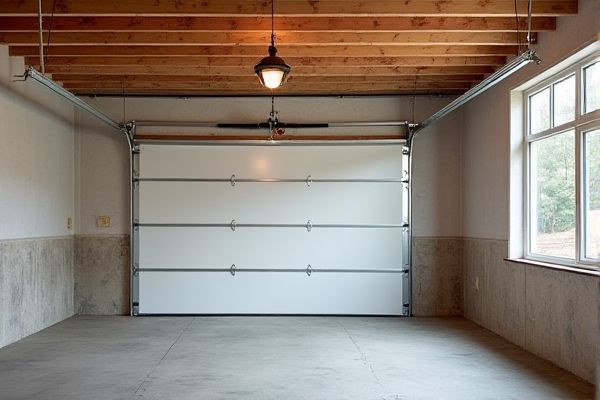
Garage door insulation kits offer a cost-effective way to improve your door's energy efficiency by reducing heat loss and noise without requiring professional installation. Comparing these kits to built-in insulation solutions reveals differences in durability, insulation value, and installation complexity that you need to understand before making a decision; explore the rest of the article to find the best option for your garage.
Table of Comparison
| Feature | Garage Door Insulation Kit | Built-In Garage Door Insulation |
|---|---|---|
| Installation | DIY-friendly, easy to install | Pre-installed during manufacturing |
| Thermal Performance | Moderate insulation value (R-value 2-3) | Higher insulation value (R-value 6+) |
| Cost | Low to moderate cost | Higher upfront cost |
| Durability | Subject to wear, may need replacement | Long-lasting, integrated in door structure |
| Energy Efficiency | Improves heat retention, less efficient | Maximizes energy savings, superior insulation |
| Customization | Variety of materials and thicknesses available | Limited to manufacturer's door designs |
| Noise Reduction | Moderate noise dampening | Enhanced noise insulation |
| Maintenance | Requires occasional upkeep, minor repairs | Minimal maintenance needed |
Overview: Garage Door Insulation Kit vs Built-In
Garage door insulation kits provide a customizable and cost-effective way to enhance thermal efficiency by attaching foam or reflective panels directly to existing doors. Built-in insulated garage doors feature factory-installed insulation materials like polystyrene or polyurethane, offering superior energy efficiency, noise reduction, and durability. Choosing between an insulation kit and a built-in option depends on factors such as budget, climate, and the garage door's age or condition.
Key Differences Between Kits and Built-In Insulation
Garage door insulation kits provide a flexible, cost-effective way to improve thermal efficiency by adding panels or foam inserts directly onto existing doors, whereas built-in insulation is integrated during manufacturing for superior, uniform performance and durability. Kits are typically easier to install, allowing for customization and upgrades to your current garage door, while built-in insulation ensures enhanced energy savings and noise reduction from the start. Your choice depends on whether you prioritize installation convenience and affordability or long-term insulation quality and seamless integration.
Energy Efficiency: Which Option Performs Better?
A garage door insulation kit improves energy efficiency by adding thermal barriers directly to your existing door, reducing heat loss and preventing drafts. Built-in insulated garage doors, however, feature factory-applied insulation materials within the door panels, offering superior and consistent thermal performance. When comparing both, built-in options generally outperform insulation kits in maintaining temperature control, making them the better choice for optimal energy savings.
Installation Process: DIY Kits vs Built-In Solutions
Garage door insulation kits offer a straightforward installation process that suits DIY enthusiasts, typically involving cutting and attaching pre-measured panels with adhesive or fasteners, which can be completed in a few hours. Built-in insulation solutions require professional installation due to their integration into the door's construction, ensuring seamless thermal performance but increasing initial labor costs. Your choice depends on balancing the ease and cost-effectiveness of DIY kits with the durability and efficiency of factory-installed insulation.
Cost Comparison: Upfront and Long-Term Savings
Garage door insulation kits typically offer a lower upfront cost, ranging from $50 to $150, making them an affordable DIY solution for improved energy efficiency. Built-in insulated doors, however, come with higher initial costs between $500 to $1,500 but provide superior thermal performance and durability, leading to significant long-term energy savings. Over time, the enhanced insulation and weather resistance of built-in doors can reduce heating and cooling expenses more effectively than retrofit kits.
Durability and Maintenance Considerations
Garage door insulation kits typically use foam or fiberglass panels that can deteriorate over time and may require periodic replacement or repair due to exposure to moisture and temperature fluctuations. Built-in insulation, integrated during manufacturing with materials like polyurethane or polystyrene, offers superior durability by providing a continuous thermal barrier less prone to damage and moisture infiltration. Maintenance for built-in insulated doors is generally minimal compared to kits, which may require more frequent inspection and upkeep to maintain their insulating properties.
Noise Reduction Capabilities
Garage door insulation kits offer effective noise reduction by adding a layer of material that dampens sound vibrations, making garages quieter during operation. Built-in insulation, integrated during manufacturing, provides superior and consistent noise reduction due to its seamless design and quality materials. To enhance your garage's noise control, choosing built-in insulation delivers longer-lasting and more efficient soundproofing compared to aftermarket kits.
Impact on Garage Temperature Stability
Garage door insulation kits provide an effective and affordable way to improve your garage's temperature stability by reducing heat transfer through the door surface. Built-in insulation options, integrated during door manufacturing, typically offer superior thermal performance with better R-values and seamless coverage. Choosing the right solution can significantly enhance energy efficiency and maintain a consistent temperature inside your garage year-round.
Aesthetic and Design Flexibility
Garage door insulation kits offer greater aesthetic and design flexibility by allowing homeowners to customize insulation without altering the original door appearance, maintaining the existing style and color. Built-in insulation, integrated during manufacturing, provides a seamless look but limits options for later design changes or upgrades. Kits enable easy updates and personalization, ideal for those seeking both energy efficiency and tailored visual appeal.
Choosing the Best Insulation Solution for Your Garage
Garage door insulation kits offer a flexible, DIY-friendly option to improve energy efficiency and temperature control in your garage, making them ideal for homeowners seeking cost-effective upgrades. Built-in insulation, integrated during manufacturing or professional installation, provides superior thermal performance and durability for long-term benefits. Considering factors like budget, installation complexity, and insulation R-value helps you choose the best solution tailored to your garage's needs.
 homyna.com
homyna.com